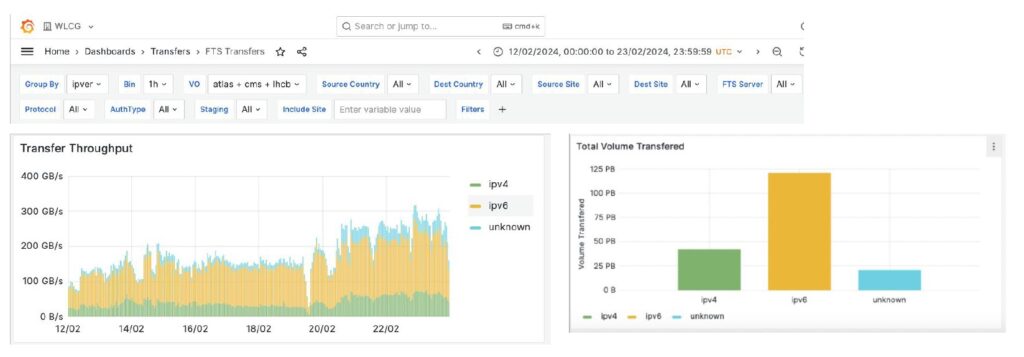IPv6 and Its Importance for Research and Development (R+D)
06/08/2024

By Henri Alves de Godoy Computer Network Analyst | Professor Ph.D. | IPv6 HoF Evangelist | AWS CCP
CERN is a center of excellence in scientific research, where physicists from around the world collaborate to explore the fundamental properties of subatomic particles. CERN is home to the Large Hadron Collider (LHC), the largest and most powerful particle accelerator in the world. CERN is also well-known in the field of information technology because it was there that scientist Tim Berners-Lee invented the World Wide Web (WWW) in 1989 to improve communication among researchers, and it is thanks to this research that we can browse the Internet today.
Similarly, in Brazil we have SIRIUS. Located in Campinas/São Paulo, SIRIUS is one of the most advanced synchrotron light sources worldwide and represents a significant milestone for science and technology in Brazil, something to be proud of. SIRIUS allows conducting highly complex and precise scientific experiments that would not be possible with other infrastructures, enables the development of new medications and treatments, and serves as a training center for scientists and engineers. Undergraduate and graduate students can conduct cutting-edge experiments and collaborate with internationally renowned researchers.
But what does the IPv6 protocol have to do with research and development?
In one of my articles, I discussed the technological inequality caused by the delay in the adoption of IPv6, mentioning that the transition to IPv6 is not only a matter of technical necessity, but also a strategic issue for the future economic and technological development of any nation.
In line with this, Tim Chown recently gave a presentation on the implementation of IPv6 at CERN and its operational aspects. This presentation confirms what I wrote in my article: given their specific network and data communication needs, IPv6 adoption is crucial for both CERN and SIRIUS. The presentation highlights:
- Need for IP addresses: CERN and SIRIUS each operate one of the largest existing research networks to which thousands of devices are connected, including servers, personal computers, sensors, and laboratory equipment. Thanks to the vast address space it provides (2^128 addresses), IPv6 ensures the expansion of their infrastructure without having to worry about the scarcity of IP addresses.
- Continuous growth: As the data generated by experiments such as those conducted at the CERN LHC and the SIRIUS synchrotron light source continues to grow, the need for new devices and, consequently, new IP addresses is constantly increasing.
- Global compatibility: As organizations that collaborate with scientists and institutions worldwide, CERN and SIRIUS need an Internet protocol that works uniformly across different regions. IPv6 facilitates this global interoperability.
- Efficient Data Transmission: Both CERN and SIRIUS generate and process large volumes of experimental data. IPv6 can improve data transmission efficiency, reducing latency and increasing data transfer speed.
Universities and research centers often collaborate on projects that require sharing large volumes of experimental data. For example, data generated by the CERN LHC is studied by scientists around the world. These centers are already prepared to communicate via IPv6. Figure 1 shows a comparison of the volume of IPv4 and IPv6 traffic. As we can see, IPv6 traffic is higher than IPv4.

Universities and research centers that do not adopt IPv6 may face interoperability issues with IPv6-ready Institutions, making international collaboration difficult.
Imagine you are working on an important research project or need to collaborate with another research center, but you have not yet deployed the IPv6 protocol, a technical requirement for participation. If you are not IPv6-ready, you simply will not be able to join the collaboration. This means losing access to valuable data, potential funding and publication opportunities, as well as becoming isolated from international research networks that have already migrated to IPv6, all of which will limit your future collaborations.
Thus, the lack of preparation for IPv6 can have serious consequences for universities and research centers, excluding them from important collaborations, causing technical difficulties, impacting network performance, and creating security issues.
Advancing in the adoption of the IPv6 protocol is essential and urgent. This must not be delayed, as the costs of postponing this transition will be significantly higher, both in financial terms and in terms of lost scientific opportunities. Investing now in the transition to IPv6 will ensure that universities and research centers remain at the forefront of science and innovation, with the ability to participate fully in the international collaborations that shape the future of scientific research and development.
The views expressed by the authors of this blog are their own and do not necessarily reflect the views of LACNIC.